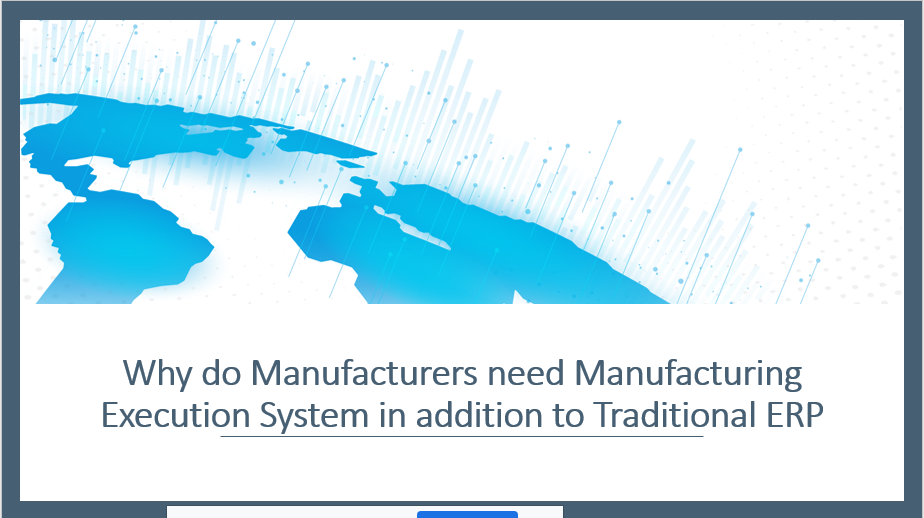Manufacturers use ERP systems like Tally, Busy, SAP B1, Oracle, SAP S4 for financial control. They monitor and complete all financial transactions on such platforms. These systems are called Traditional ERP systems. A traditional ERP system fulfils the needs of visibility into financial and all things related to money movement. But, we would like to bring in the picture the more practicality of Manufacturing ERPs (ERP for manufacturing industry) vs Traditional ERPs in our content.
Very soon manufacturers realised that traditional ERPs are not so useful when it comes to managing their sales and marketing pipeline. In today’s world, there are offline and online channels to generate leads. Traditional ERPs do a poor job of giving an overview of the sales and marketing funnel. Manufacturers use new age CRMs to cater to this need. They deploy solutions like Zoho CRM, Salesforce etc.
Similarly some manufacturers use specialised software for purchase, human resource management and other functions. These focused software have much more depth and breadth in terms of functionality within their functions. They are able to cater to more use cases more efficiently.
Why are Traditional ERPs not able to serve Manufacturing Needs
Manufacturing Execution System or Manufacturing ERP or Manufacturing Operations Management is a system that is entirely focused on manufacturing. It takes care of various departments in manufacturing like Inventory Management, Live Production Tracking, Planning, Maintenance, Quality Management. These functions are available in traditional ERP but are not able to fulfil Manufacturer’s need. Lets understand in points about our discussion of Traditional ERPs vs Manufacturing ERPs.
- Traditional ERPs lack depth. They are superficial in their offering. They are good at capturing the RW and FG as far as material management is concerned. However, they fail to capture or indicate the WIP material. Thereby decision makers are often in the dark in which stage the orders are
- Traditional ERP fail to capture operational data in details- such as Scrap generation, labour efficiencies, downtime & reasons
- Traditional ERPs are more rigid since they are capturing the data at a macro-level. Thus they become difficult to customise and are often not able to handle the process changes as manufacturers upgrade their production processes
- Traditional ERPs are not customizable: Since their main function is financial management, they do not invest in building flexibility around Manufacturing
- Frontline workers like Operators, Supervisors, Quality Managers, Production Managers are not able to use them
- Traditional ERPs do not give customizable dashboards required for managing factories
- Traditional ERPs cannot be integrated to IoTs
- It is difficult to to configure multiple factories, multiple production lines
Traditional ERPs are not able to serve manufacturing needs doesn’t mean that manufacturers should discard them. They are very good systems in managing finance and that’s how they should be used. However when it comes to Manufacturing, manufacturers should implement a Manufacturing Execution System. Manufacturing Execution System (or ERP software for manufacturing) is a class of software that gives complete visibility into factory operations. It is able to take care of 4 Ms of manufacturing namely Machines, Material, Method and Manpower.
MES helps many industries to get good production results such as Auto Component, you can learn more about it in our blog MES Auto Component Industry.
Introduction to Manufacturing Execution System
The underlying architecture of such a software is to accommodate factory operations. It digitises operations like movement of material, change overs, tool management, shift allocation, operator efficiencies. MES helps frontline workers with work instructions, guides them in better production. It analyses reasons for machine downtime and gives manufacturers a comprehensive analysis of MTTR (Mean Time To Repair). MES also brings accountability into the entire factory setup.
Manufacturing Execution System integrates all the factory operations and gives one comprehensive view to the manufacturers. Manufacturers like to manage their factories with certain set of KPIs. These KPIs can be like Planned vs Actual Production, Inventory holding time, On Time Deliveries to customers. These KPIs are available in Manufacturing ERP at the click of a button. MES not helps the manufacturer but also the Production Manager, Planning Manager in better manage and execute their responsibilities.
Companies that are building software for manufacturing operations are just focused on it. As a result, they are able to continuously add features that reflect the change in way manufacturing operations are carried. They are constrained by how other enterprise softwares like Financial Management & Control, CRM, Purchase etc. work. They are able to deliver value to Manufacturer.
It is a myth to think that such kind of software can only be implemented by large manufacturers. ManufApp’s vision is to help small and medium manufacturers in getting more out of their current operations. Many small manufacturers have got immense benefit from the ManufApp system. To understand how ManufApp can help you in managing your factory operations, please schedule a demo with the ManufApp team here.
We can also refer to the article from Forbes about future of Manufacturing ERPs in coming era (https://www.forbes.com/sites/forbestechcouncil/2023/05/24/re-globalization-part-1-back-to-the-future-with-manufacturing-erp/)





